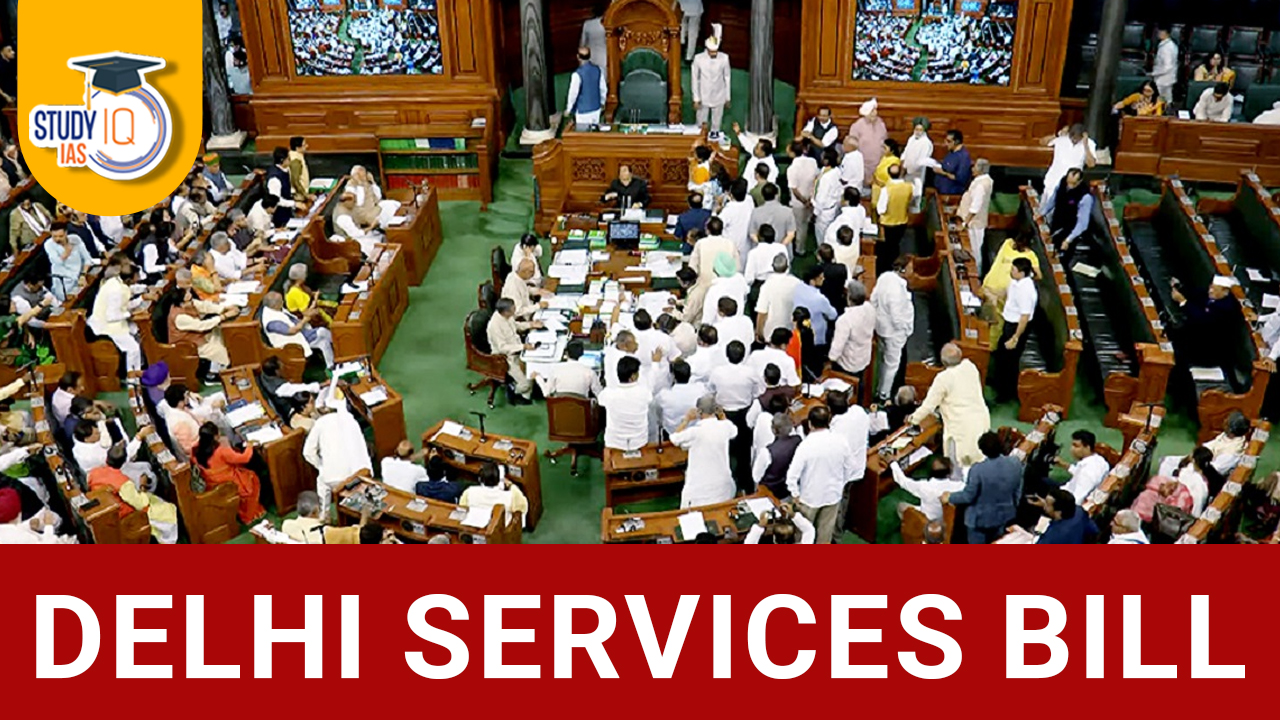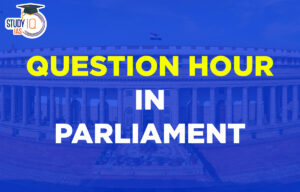Table of Contents
Delhi Services Bill 2023
Delhi Services Bill 2023 was passed in Rajya Sabha of parliament on August 7, 2023, amid uproar from the Opposition after passed in Lok Sabha. The Delhi Services Bill garnered support from 131 MPs through their votes, while 101 votes were cast against this bill. Delhi Services Bill intends to replace the Delhi Ordinance Bill 2023.
Delhi operates as a Union Territory with its own legislature and Council of Ministers. However, there has been ongoing debate and disagreement regarding the division of powers between the Delhi government and the central government. In 2023, the Supreme Court settled the matter by ruling that the Delhi government has control over services, except in areas such as police, public order, and land, which fall under the purview of the central government. This ruling clarified the distribution of authority, bringing clarity to the functioning of the Delhi government. Having understood this context, now we will discuss the Delhi Ordinance Bill or Delhi Services Bill 2023 which seeks to replace the ordinance.
What is Delhi Ordinance Bill 2023?
The Government of National Capital Territory of Delhi (Amendment) Bill, 2023 also known as Delhi Services Bill 2023, introduced in the Lok Sabha on August 1, 2023, aims to replace the Government of National Capital Territory of Delhi (GNCTD) Amendment Ordinance, 2023 also known as Delhi Ordinance Bill, promulgated on May 19, 2023.
Delhi Services Bill 2023 Details
As per the Central government’s standpoint, the objective of the Delhi Services Bill 2023 is to uphold a “democratic and administrative equilibrium in the governance” of the National Capital Territory of Delhi. The contentious Bill seeks to substitute the existing ordinance governing the transfers and appointments of senior officers within the Delhi government. Here we discussed the highlights of the Delhi Services Bill 2023 in detail as follows:
Establishment of the National Capital Civil Services Authority
The Delhi Services Bill proposes to establish the National Capital Civil Services Authority, consisting of the Chief Minister, the Chief Secretary of Delhi, and the Principal Home Secretary of Delhi. This authority will make recommendations to the Lieutenant Governor (LG) concerning transfers, postings, disciplinary matters, and vigilance related to certain categories of civil servants.
Empowering the LG
The Delhi Services Bill grants additional powers to the LG, allowing him to exercise sole discretion on various matters, including those recommended by the National Capital Civil Services Authority. The LG will also have the authority to summon, prorogue, and dissolve the Delhi Legislative Assembly.
Role of Department Secretaries
The Delhi Services Bill authorizes department secretaries to directly bring certain matters to the attention of the LG, Chief Minister, and Chief Secretary. These matters include issues that may potentially create controversies between the Delhi Government and the Central Government.
Who Passed Delhi Services Bill 2023?
Delhi Services Bill 2023 is first passed by Lok Sabha and then Rajya Sabha. On August 3rd, the Delhi Services Bill was Passed in the Lok Sabha through a voice vote subsequent to a walkout by I.N.D.I.A. members. Moving forward to August 7, 2023, the Rajya Sabha successfully passed the Delhi Services Bill 2023 with the backing of 131 Members of Parliament.
Delhi Services Bill in Lok Sabha
The Government of National Capital Territory of Delhi (Amendment) Bill, 2023 or Delhi Services Bill, 2023 was tabled in Lok Sabha amid significant opposition uproar. The Bill aims to replace the National Capital Territory of Delhi (Amendment) Ordinance, 2023, or Delhi Ordinance Bill, 2023 and has been a subject of contention between the ruling party and the opposition. The Bill seeks to empower the Lieutenant Governor of Delhi with more authority, leading to accusations from the opposition that it will replace democracy with “babucracy” in Delhi.
The Union Home Minister, Amit Shah, initiated the debate on the Bill and launched a scathing attack on the Aam Aadmi Party (AAP), which governs Delhi and is opposing the Bill. He accused the AAP of corruption and indulging in confrontation instead of governance. He argued that the Centre has the constitutional authority to make laws for Delhi-NCR and refuted allegations that the Bill breaches the Supreme Court’s judgment, which granted more powers to the elected government of Delhi over services, except on three issues.
On the other hand, Delhi Chief Minister, Arvind Kejriwal, reacted strongly to Amit Shah’s remarks, stating that the Bill will make the people of Delhi slaves and helpless. He believes that the Bill is wrong and goes against the spirit of the Constitution. The Congress leader of opposition in Lok Sabha, Adhir Ranjan Choudhary, also expressed opposition to the Bill, asserting that it is an attack on the federal structure of the country and seeks to usurp the power of the elected government in Delhi.
The Delhi Ordinance Bill is part of an ongoing political tussle between different parties over governance and administrative control in Delhi. The opposition has been critical of the Bill, while the ruling party is advocating for it as a necessary measure. The discussion and debate surrounding the Bill are expected to continue in Lok Sabha and other forums.
Delhi Services Bill in Rajya Sabha
The Government of National Capital Territory of Delhi (Amendment) Bill, 2023, or Delhi Services Bill, 2023 which aims to replace the ordinance on control of services in Delhi, has been cleared by the Lok Sabha after a walkout by opposition parties. Union Home Minister Amit Shah will now present the Bill before the Rajya Sabha tomorrow for further consideration and approval.
The Bill seeks to set up a National Capital Civil Service Authority for the transfer and posting of Group-A officers in Delhi. The Authority will consist of three members, including the Chief Minister and two bureaucrats, and decisions will be taken by a majority vote. In case of disputes, the matter will be referred to the Lieutenant Governor (L-G), whose decision will be final. The AAP government in Delhi has challenged the constitutional validity of the ordinance in the Supreme Court, and the plea has been referred to a Constitution Bench.
During the debate in the Lok Sabha, Amit Shah strongly criticized the Opposition, accusing them of being more concerned about saving their newly formed alliance than democracy or the people. He emphasized that despite any Opposition alliance, Prime Minister Narendra Modi would return with a “complete majority” after the 2024 elections.
The Bill has received support from the BJP’s allies, including the YSRCP and the BJD, who have announced their backing. The BJD and YSRCP have nine members each in the Rajya Sabha, and with their support, the ruling side is likely to cross the halfway mark in the Upper House. On the other hand, the combined Opposition, along with the Bharat Rashtra Samithi, which opposes the Bill, may have fewer than 110 members.
As the Bill moves to the Rajya Sabha, further debates and discussions are expected to take place before a final decision is reached on its enactment. The support of various parties will play a crucial role in determining its fate in the Upper House.
Delhi Services Bill 2023 Impact on Delhi Governance
Here we will discuss how Delhi Services Bill 2023 can prove to be a game-changer for the governance of Delhi i.e., the Capital of India.
- Because, if the Delhi government does not have control over civil servants, it cannot execute any programmes across any sector in its jurisdiction.
- This bill establishes a body called National Capital Civil Services Authority (NCCSA) which will make recommendations to the LG, who is appointed by the Union government.
- This Body will include 3 people out of which 2 are appointed by the central government and the third one will be the chief minister of Delhi.
- The decisions of the committee will be based on a majority and therefore creates the possibility for the Union government-appointed members to overrule the decisions of the chief minister.
- The LG’s decision will also prevail over this body if there is a difference of opinion and the bill also empowers the LG to exercise his “sole discretion” on several matters.
Delhi Services Bill 2023 UPSC
The Delhi Services Bill 2023 is an important topic for UPSC as it reflects the ongoing debate surrounding the control of services in the national capital. Understanding the constitutional provisions related to Union Territories, the role of the Lieutenant Governor, and the powers of the elected government in Delhi is crucial for UPSC aspirants as it falls under the domain of Indian Polity and Governance, a significant part of the UPSC Syllabus. Moreover, staying updated with current affairs and government policies, like this Bill, is essential for the UPSC examination, and it can be covered through UPSC Online Coaching platforms and UPSC Mock Test to enhance preparation and analytical skills.
| Other Important Indian Polity Articles | |
| Indian Constitution | Law Commission of India |
| Money Bill | Constitution Amendment Bill |
| Financial Bill | Lapsing of Bills |
| Appropriation Bill |
Difference Between Money Bill and Finance Bill |


 Question Hour in Parliament: Meaning, Ty...
Question Hour in Parliament: Meaning, Ty...
 List of Governor of States in India, Con...
List of Governor of States in India, Con...
 Maharashtra Bill to Curb Urban Naxalism,...
Maharashtra Bill to Curb Urban Naxalism,...





















